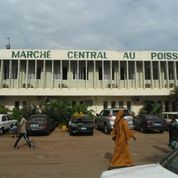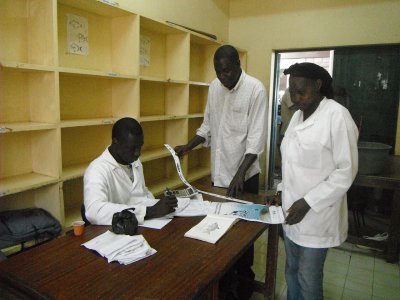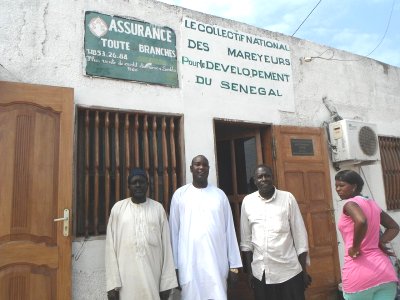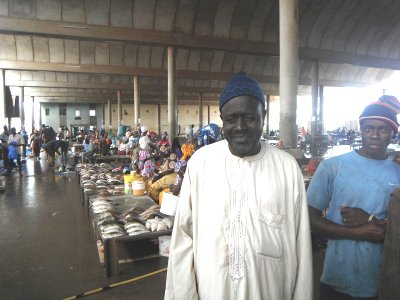by Aliou Sall
The fish goes where people can pay for it. Well-to-do people in Dakar enjoy the freshly landed fish in urban markets in the old city centre. The Kermel Market is a historical market (first opening in 1860) where fish, fruit and vegetables are the major fresh products for sale. Restored to its former glory in 1997, the market attracts many local and international customers. The fish sellers received a visit of Mundus marisin September 2012 to help them make good purchasing decisions for their customers and for themselves: the idea was to check whether the fish on sale was of adult size. Avoiding the sale of baby fish helps sustain the business on the long run. The measurements were made with the help of the fish ruler developed during the FAO-EAF Nansen pilot activities for teaching the ecosystem approach to fisheries. Protecting baby fish and taking only grown individuals, which have reproduced themselves, will make the entire value chain more sustainable, from the customers to the fishers.
For two years, Mundus maris pursued a project in collaboration with a few pilot communities of fishermen in Senegal. The objectives and the results achieved through this project can be appreciated as a result of activities undertaken within the Mare Nostrum project. The actions towards the fisherfolk thus did not just begin today with projects and other ongoing activities in the following communities: Kayar, Hann, Yoff and Guet Ndar in St. Louis.

The awareness campaign to promote the observance of minimum sizes for fish during the month of September 2012 has its own specificity: the effort is directed towards a category of wholesalers and particularly those in a very specific space: the fishmongers working in urban markets right in the capital Dakar.
What are the challenges represented by addressing this category of people in this specific area and what is the interest in intervening at this level? Which strategy is adopted? What are the results achieved and what are the future prospects with leaders of trade associations met at the scene?
The principal reasons for Mundus maris to chose conducting an awareness programme on good practice to guarantee the sustainability of the fishery specific to these actors are the following: First, a market like Kermel in Dakar, because of its distance from the fish landing places, does not automatically create the opportunity for the wholesalers to be exposed to the different ongoing programmes related to the resource crisis.
As a result and given the way they work normally, they are not familiar with the concept and practice of sustainable development: They just pass the minimum time required for the purchase of products from the fishing ports and spend most of the day marketing the products. This is why Mundus marishas expanded its training and awareness towards these actors working at the city centre.
Second, given the importance of involving consumers in awareness campaigns in favour of good practices for sustainable development, the Kermel Market is the place of choice of the rich and middle classes of the Senegalese capital (Senegalese and all nationalities living in the capital). The pretty good state of food safety and hygiene, thanks to good maintainenace compared to other markets for ordinary people, in fact makes Kermel the meeting point of a class of educated consumers, including the Diplomatic Corps in Senegal. This category of consumers is in principle receptive to messages about practices that will promote sustainable development, compared to other types of ordinary consumers, often animated by a certain fatalism about the increasing degradation of resources.

To reach these fishmongers, the local coordination of Mundus maris paid a visit to the market after meeting Mr Kellé Seck, leader of one of the groups of fishmongers exercising their professional at the Kermel Market, in another occasion not related to fisheries. During this initial contact, we made a presentation of Mundus maris, but also of the tools that could be of direct interest to the wholesalers: the fish ruler, the poster with soda cans for fish measurements and the poster about the Senegambian ecosystem, which had been initially developed in the context of pilot activities of the EAF Nansen Project of FAO for the introduction of the ecosystem approach to fisheries.
Following this initial meeting, the fishmongers invited us to come back and explain the poster, help them to interpret it correctly, but also to make fish measurement tests with them. We have spent a good four hours at a time on the market for the day of demonstration and information.
Regarding the results and perspectives, we can say that the experiment was successful and very encouraging. The most striking is the fact that the measurements have shown that many fish species are consumed below the minimum sizes indicated on the fish ruler. As a result, the fishmongers expressed one single question: how to get the fish ruler. But they also enjoyed the measurement with the soda cans.

For proof, one group has volunteered to play its full role as opinion leaders in the market. It is driven by Kellé Seck. In addition, in order to reach the consumers, before leaving we have left some posters to stick to the walls.
In the future, the group of wholesalers would like us to organize with them a full day of awareness, as soon as we are ready. This should be done in collaboration with relevant departments: Fisheries Department, the Municipality of Dakar, and others.
Los mariscos que comemos
- World Food Day 2024, Joint Webinar with Fish Party
- Relator Especial de la ONU sobre el derecho a la alimentación
- Audiencia del Parlamento Europeo sobre la iniciativa ciudadana de la UE para detener el corte de aletas de tiburones
- Keynote at the ‘Feed the Future – Innovation Lab for Fish’
- Seminario web de la FAO ‘Peces pequeños y de bajo coste: del cebo al plato’, 15-16/02/2021
- Disfrute de deliciosos y sostenibles pescados y mariscos con los talleres de Mundus maris
- Chiloé, o: Los desastres de Salmonopoly
- Seafood Symposium – From Fisheries to Foodies, 27 April 2015
- Baltic students concerned about sustainable foods, Rogow, Poland, 15-19 April 2015
- From plates to fuel – the controversial seaweed boom in Chile
- Khazan – Traditional coastal zone management in Goa, India
- Environmentally conscious consumer behaviour in food – what can I do?
- Save baby fish or Point ‘n’ kill?
- “Inseparable” – Fish sustainability campaign celebrates event in Athens
- Respetar la talla mínima de los peces ¿Qué dicen los comerciantes de pescado en el Senegal?
- The Mundus maris campaign in the urban markets in Dakar
- Let’s save the Oceans! – Cercle Europa invites
- International Study Group Brussels: Save the Seas!
- Mercado San Miguel in Central Madrid




